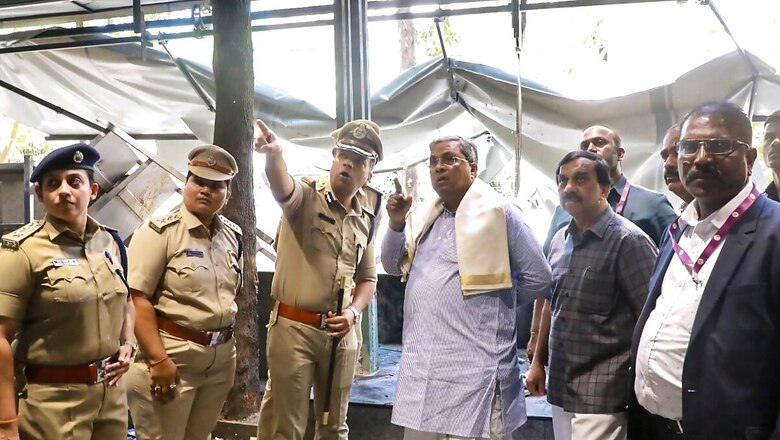
views
Forensic and bomb analysis specialists from the NIA and FSL, who are working closely with those probing the blasts at a Bengaluru eatery, have found similarities in the assembly of the timer device used in the Coimbatore car and Mangaluru cooker terror attacks that took place in October 2022 and November 2022, respectively.
Obtained from the blast site, the timer device used to detonate the bomb at the popular Rameshwaram Cafe in Bengaluru is key for the Bengaluru police to find links to those responsible. Asked if there were similarities between the Mangaluru and Rameshwaram blasts, Karnataka chief minister Siddaramaiah said, “Investigation is on.”
But his deputy, DK Shivakumar, clearly hinted at a possible link between the two cases. “There seems to be a link between the Mangaluru incident and this incident, according to police officers… material used for these explosions, we can see similarity, a common link like the timer and other things,” he said.
Special teams have gone to Kerala, Coimbatore, Mangaluru, Bhatkal and Shivamogga to trace and gather evidence that may link these terror cases. Police sources had earlier told News18 that they have recovered important evidence at the blast site that points at the possibility of a similar or the same terror group being involved in the Coimbatore as well as the Mangaluru blasts.
The explosive material found at the site and the use of a moving vehicle for the projectiles or shrapnel to spread over a larger area and cause more damage, are uncanny similarities to the previous attacks. Now, investigators are in the process of tracing links between these three blasts and banned organisations like the Popular Front of India (PFI) and Al Ummah.
They are keeping a close watch on sleeper cells of smaller fringe terror groups, who may have been communicating with the handlers or the accused in these cases.
Mangaluru cooker blast
The coastal town of Mangaluru in Dakshina Kannada is known to be a communally sensitive region. The cooker blast in November 2022 took place just months before the assembly elections.
The alleged bomber in the case, identified as Shariq, had been found transporting a crude bomb assembled in a pressure cooker. The accused, who originally hails from Shivamogga’s Teerthahalli, used a local auto-rickshaw to transport the cooker bomb with the intent to cause maximum impact with the use of a moving vehicle, investigators said.
In the blast, which was of a low intensity like the one in Bengaluru, the bomb accidentally went off while being transported in the auto-rickshaw. It is said to have detonated as the explosive material heated up due to friction. The auto-rickshaw driver, Purushottam, had suffered burn injuries and was later discharged after treatment.
A few days after the blast, the Mangaluru police received a letter from an unknown group called ‘Islamic Resistance Council’, claiming responsibility. The letter typed in English with a photo of Shariq printed on it said “he attempted to attack the Hindutva temple in Kadri, a bastion of the saffron terrorists in Mangalore”.
The police in this case had also said Shariq had successfully tested a bomb in September using a low-intensity improvised explosive device (IED). He had undergone a 45-day training session at a mobile phone centre and used this expertise along with two other associates, Syed Yasin and Maz Muneer Ahmed, to conduct a dry run along the banks of the Tunga river in Shivamogga.
The timer device placed inside the cooker bomb is similar to the one found at the last location inside Rameshwaram Cafe.
Coimbatore cylinder bomb blast
Karnataka police probing the Mangaluru cooker blast found several similarities to the Coimbatore cylinder blast in October 2022. Here, too, the timer device used as well as the modus operandi had several similarities, said police sources.
Jameesha Mubin, the main suspect in the case, was seen as a “copycat Islamic State (IS) jihadi”, who wanted to avenge the atrocities against his community. Driving a Maruti 800 car carrying an LPG cylinder laden with explosives, the car exploded close to the Sangameshwara temple in Coimbatore.
The accused allegedly wanted to attack the temple premises and detonate the bomb inside. Mubin, however, hit a speed breaker en route causing the gas cylinder to explode and ignite. He too was killed in the blast. The self-assembled bomb exploded even before Mubin could reach the temple, senior Tamil Nadu police source had said.
What are the links?
News18 had earlier reported how the central agencies, including the National Investigation Agency (NIA), probing the Mangaluru and Coimbatore blast cases had discovered a vital link between the two terror incidents. Mubin and Shariq had both visited a man being held in a jail in Kerala’s Kochi. Officials suspect that the person was their handler.
Investigators in the Rameshwaram Cafe case are also analysing this angle, but a senior official said their entire effort is to first identify the suspect and arrest him. “We have made significant progress and have a lot of footage that shows the suspect and even his face at certain places. It is just a matter of time before we get hold of him,” the police officer said.
In July last year, the Bengaluru police busted a city-based ISIS module and arrested five men aged between 25 and 35, for alleged links to terror activities. Months later in December, the NIA foiled a Ballari ISIS module and arrested their main leader Minaz alias Mohammed Sulaiman and eight other operatives. The NIA raided 19 locations across four states, foiling plans to carry out attacks using self-built IED explosives.
Raw materials such as sulphur, potassium nitrate, charcoal, gunpowder, sugar and ethanol; electronic parts like wires and circuits; sharp-edged shrapnel material; unaccounted cash and radical material; smartphones and simple phones that could be used as trigger devices, were found in their possession. The places raided were Ballari and Bengaluru in Karnataka; Amaravati, Mumbai and Pune in Maharashtra; Jamshedpur and Bokaro in Jharkhand, and Delhi.















Comments
0 comment